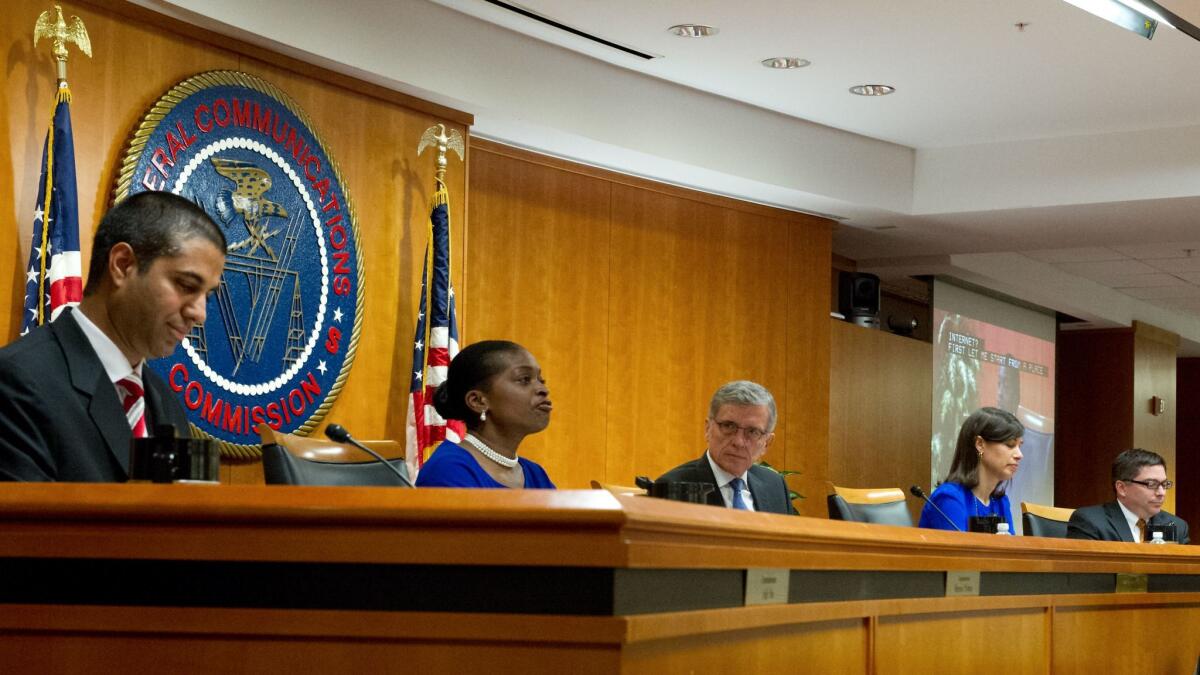Opinion: The FCC should lay its net neutrality cards on the table

- Share via
Ajit Pai, one of two oft-ignored Republicans on the five-member Federal Communications Commission, could be rolled again later this month if the FCC adopts a tough new set of rules to preserve net neutrality. So Pai, who opposes the whole idea of neutrality rules, has spent the last several days denouncing the plan as oppressive regulation that will strike broadband dead.
OK, that’s a little exaggerated. But then, so are many of Pai’s arguments, which predict that Chairman Tom Wheeler’s efforts to preserve freedom and innovation online will eventually be used to crush small companies and micromanage the net.
Still, he’s right about one thing. The latest proposed rule, which Wheeler described in an op-ed but hasn’t made public, is a huge departure from the one the commission put out for comment last year. Considering the legitimate questions that Pai and other critics have raised about its effects, the commission should break with tradition and release the proposed rule now, well before the vote on Feb. 26. That way the public can have an informed debate about what’s actually in the plan, instead of exchanging ideological broadsides about its origins and effects.
The FCC’s standard operating procedure is to publish a proposed rule, collect comments on it, then adopt some version of it months later without releasing the final text until after the vote. In fact, it can take weeks for the commission to disclose the text of an approved new rule.
This approach has drawn the occasional rebuke from federal appellate courts. For example, in 2011 the 3rd Circuit Court of Appeals threw out a rule easing the ban on local broadcasters owning the newspapers in their communities, finding that the agency hadn’t given the public enough advance notice about the rule’s provisions.
In the case of net neutrality, the commission published a proposal in May to adopt flexible rules against Internet service providers entering “commercially unreasonable” deals that blocked websites, throttled traffic or favored some sites and services over others. After that proposal was denounced by millions of Internet users and President Obama, Wheeler came up with a new plan to reclassify ISPs as utilities and impose strict neutrality rules based on Title II of the federal Communications Act.
The original notice of proposed rulemaking clearly indicated that the FCC could go in that direction, and it asked the public to comment on the pros and cons of using Title II. It also asked what provisions of Title II should be waived if the FCC decided to reclassify ISPs as utilities.
The public responded by commenting extensively (and usually favorably) on the use of Title II, just as many ISPs commented about the drawbacks of that approach. That created an extensive record on the issue, which Wheeler and other top FCC officials say eliminates the need to put the new proposal out for another round of comments.
Even so, the specifics of the new proposal matter. For example, Wheeler has said that his proposal wouldn’t control ISPs’ prices because the FCC would formally forbear from enforcing the two provisions of Title II that authorize rate regulation. But Pai noted that other provisions that would be enforced would authorize the FCC to regulate the prices and terms of an ISP’s service in response to consumer complaints. Considering how badly the specter of rate regulation can spook investors, that issue deserves a more thorough public vetting.
Another example is the proposed “general conduct rule” that Pai said would make it harder for ISPs to compete with innovative and consumer-friendly offers. In particular, Pai said, the proposal called into question “zero-rating” programs, such as T-Mobile’s Music Freedom offering, which allows subscribers to stream music from two dozen online services without reducing their monthly data allowances. “Preventing companies from differentiating themselves from the competition by giving consumers a wide variety of options will simply mean less choice and less free data for consumers,” Pai argued.
Granted, Pai peppered his critique of the proposal with partisan, credibility-draining arguments, such as his repeated references to the proposal as “President Obama’s plan to regulate the Internet.” The fact that Wheeler eventually joined Obama -- and many, many other net neutrality advocates -- in embracing Title II says nothing about the merits of the proposal. Even Pai agreed Tuesday with Wheeler’s (and Obama’s) stated goal: to preserve the open Internet. The only debate has been over how to achieve it.
But just because Pai and his fellow Republicans are trying to turn the net neutrality proceeding into “Broadbenghazi,” as Harold Feld of Public Knowledge put it, that doesn’t mean they’re wrong about the potential drawbacks of reclassifying ISPs as Title II. And though the general concept has been amply debated over the past year, there’s been no public vetting of the way Wheeler is proposing to slim down Title II so as not to stunt investment in faster broadband pipes.
Feld said one reason the commission doesn’t make the exact wording of rules public before voting on them is to allow the commissioners to engage in a final give-and-take over the provisions. Consider what Wheeler circulated privately to his fellow commissioners a rough draft, Feld said.
That’s fine, but nothing but tradition stops the FCC from sharing that draft with the public. The commission continues to accept comments from the public up to one week before it votes on a proposed rule, spokeswoman Kim Hart said. The more people know about what Wheeler is proposing, the more valuable those comments will be -- to the benefit of the FCC’s final rule.
Follow Healey’s intermittent Twitter feed: @jcahealey
More to Read
A cure for the common opinion
Get thought-provoking perspectives with our weekly newsletter.
You may occasionally receive promotional content from the Los Angeles Times.







